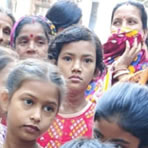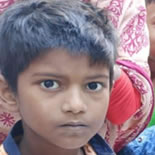Life-Saving Food Aid Solutions for Rural Bangladeshi Families by Lotus Ministry Trust
- David Burgess
- Dec 6, 2024
- 9 min read
In the heart of Bangladesh, rural communities often grapple with the harsh realities of food insecurity. These areas, far removed from the bustling cities, face unique challenges that require innovative solutions. Lotus Ministry Trust, with its dedicated mission, has been at the forefront of addressing these needs. Their work not only provides immediate relief but also lays the groundwork for long-term community resilience.
Lotus Ministry Trust Volunteers Providing Food Security
Article-at-a-Glance
Food insecurity in rural Bangladesh is a critical issue, affecting health and economic stability.
Lotus Ministry Trust has implemented effective food aid solutions that focus on immediate relief and sustainable development.
Key initiatives include the distribution of nutritious foods like kichri and fortified rice.
Partnerships with local communities enhance the impact and sustainability of food aid programs.
Overcoming logistical challenges is essential for the success of these initiatives.
Food insecurity in rural Bangladesh is not just a matter of scarcity but a complex issue tied to economic, social, and environmental factors. Most importantly, understanding these nuances is crucial for developing effective solutions.
Critical Food Needs in Rural Bangladesh
Understanding Food Insecurity in Rural Areas
Rural Bangladesh is characterized by its lush landscapes and agricultural potential. However, despite this abundance, many families struggle to put food on the table. The reasons are multifaceted. Poor infrastructure, limited access to markets, and unpredictable weather patterns often lead to food shortages. When crops fail, entire communities suffer.
Moreover, rural areas frequently lack the economic opportunities found in urban centers. This disparity means that even when food is available, it is not always affordable for those who need it most. Therefore, addressing food insecurity requires a comprehensive approach that considers both supply and demand.
Impact of Malnutrition on Communities
The consequences of food insecurity are dire. Malnutrition, particularly among children and pregnant women, leads to a host of health problems. It stunts growth, weakens immune systems, and impairs cognitive development. In adults, it reduces productivity, trapping families in a cycle of poverty.
Beyond individual health, malnutrition impacts entire communities. It strains local healthcare systems and limits educational attainment, as children who are hungry struggle to focus in school. Over time, these effects can hinder economic development, making it even harder for communities to escape poverty.
Statistics Highlighting Urgent Needs
According to recent reports, over 40% of children under five in rural Bangladesh are stunted due to chronic malnutrition. Additionally, about 31% of women of reproductive age are anemic. These statistics underscore the urgent need for effective food aid solutions.
The World Food Programme highlights that nearly 25% of the population in rural areas lives below the poverty line, exacerbating the challenges of accessing nutritious food. These figures are not just numbers; they represent real people facing daily struggles to survive.
Lotus Ministry Trust's Mission and Approach

Lotus Ministry Has Provided Over 100,000 Meals
Introduction to Lotus Ministry Trust
Lotus Ministry Trust has emerged as a beacon of hope for many rural families in Bangladesh. Founded on the principles of compassion and community empowerment, the organization seeks to address both immediate and long-term needs. Their mission is clear: to alleviate hunger and build resilient communities.
What sets Lotus Ministry apart is their holistic approach. They recognize that food aid is not just about providing meals but also about creating pathways to self-sufficiency. By combining direct assistance with community development programs, they aim to foster lasting change.
Core Objectives and Strategies
Lotus Ministry Trust operates with several core objectives in mind. First, they aim to provide immediate relief to those in need through food distributions. This is crucial for addressing the urgent hunger faced by many families.
Second, they focus on enhancing nutritional outcomes by introducing fortified foods that address specific deficiencies. This approach ensures that aid is not just about quantity but also quality. Lastly, they emphasize community engagement, working closely with local leaders to tailor their programs to the unique needs of each area.
Importance of Local Partnerships
Partnerships are at the heart of Lotus Ministry's success. By collaborating with local organizations, they gain valuable insights into community dynamics and needs. These partnerships also help to build trust, which is essential for the effective implementation of aid programs.
Moreover, working with local partners allows Lotus Ministry to leverage existing resources and infrastructure, making their initiatives more sustainable. This collaborative approach not only enhances the impact of their programs but also empowers communities to take ownership of their development.
Key Food Aid Initiatives by Lotus Ministry
Lotus Ministry Trust has developed a range of innovative food aid initiatives designed to meet the diverse needs of rural communities. Their programs focus on providing immediate relief while also building long-term resilience.
Distribution of Kichri
Kichri, a nutritious blend of rice and lentils, is a staple in many Bangladeshi households. Lotus Ministry Trust has identified it as an ideal food aid solution due to its high nutritional value and cultural acceptance. By distributing kichri, they ensure that families receive a balanced meal that is both filling and familiar.
The process begins with sourcing ingredients from local farmers, supporting the local economy while ensuring freshness. Volunteers then prepare and distribute the kichri to families in need, focusing on the most vulnerable, such as children and the elderly. This approach not only provides immediate relief but also fosters a sense of community.
Community-Based Nutritional Programs
Lotus Ministry Trust understands that sustainable change requires community involvement. Therefore, they have established community-based nutritional programs that engage local leaders and residents. These programs focus on raising awareness about nutrition, hygiene, and healthy eating habits.
Workshops and cooking demonstrations are held regularly, providing hands-on learning experiences. Participants are encouraged to share their knowledge with others, creating a ripple effect that extends beyond the immediate community. This grassroots approach ensures that nutritional improvements are maintained over the long term.
Impact of Food Aid on Rural Families
The impact of Lotus Ministry's food aid initiatives on rural families is profound. By addressing both immediate and long-term needs, they have transformed lives and strengthened communities. The benefits extend beyond nutrition, touching on health, education, and economic opportunities.
One of the most significant outcomes is the improvement in health and well-being. Families receiving food aid report fewer instances of illness and better overall health. This change is particularly evident among children, who experience improved growth and development when their nutritional needs are met.
Improved Health and Well-being
Improved health is a direct result of the enhanced nutrition provided by Lotus Ministry's programs. Children who once struggled with malnutrition now show signs of healthy growth. Parents report increased energy levels, allowing them to be more productive in their daily activities.
The positive health outcomes also reduce the burden on local healthcare systems. With fewer illnesses to treat, healthcare providers can focus on preventive care and education, further improving community health. This shift not only benefits individual families but also contributes to the overall well-being of the community.
Empowerment Through Economic Opportunities
Food aid from Lotus Ministry does more than just fill stomachs; it empowers families to pursue economic opportunities. With their basic needs met, individuals can focus on education and employment, breaking the cycle of poverty.
For example, a mother in a rural village used the time and energy saved from worrying about food to start a small business selling handmade goods. With the income she earned, she was able to send her children to school, setting them on a path to a brighter future.
This empowerment extends to the community level, as well. By sourcing ingredients locally, Lotus Ministry supports local farmers and businesses, creating a more robust local economy. This holistic approach ensures that the benefits of food aid are felt throughout the community.
Success Stories from Beneficiaries
Real-life success stories from beneficiaries highlight the transformative impact of Lotus Ministry's initiatives. Families who once faced daily hunger now have hope for a better future. Children who struggled in school due to malnutrition are now thriving, thanks to improved nutrition.
These stories serve as powerful reminders of the importance of food aid and the difference it can make. They also inspire others to get involved, whether through volunteering,
, or advocating for policies that support food security.

Lotus Ministry Trust Providing Food Aid For Rural Bangladeshis
Tackling Challenges in Food Distribution
Despite the successes, food distribution in rural Bangladesh is not without its challenges. Lotus Ministry Trust faces logistical barriers that must be overcome to ensure aid reaches those who need it most. By addressing these challenges head-on, they continue to improve the effectiveness of their programs.
Overcoming Logistical Barriers
One of the primary challenges is the remote location of many villages. Poor infrastructure and limited transportation options can make it difficult to deliver aid promptly. Lotus Ministry addresses this by partnering with local organizations that have a deep understanding of the area.
Additionally, they employ innovative solutions such as mobile distribution units and community-based delivery systems. These methods ensure that aid is distributed efficiently, even in hard-to-reach areas. By continuously refining their logistics, Lotus Ministry maximizes their impact.
Ensuring Sustainable Aid Delivery
Engage local communities in the planning and execution of aid programs.
Develop partnerships with local organizations to enhance reach and effectiveness.
Utilize technology to streamline distribution processes and track progress.
Ensuring sustainability is a key focus for Lotus Ministry. They recognize that long-term success depends on building the capacity of local communities to manage their own food security. This involves training community members in agricultural practices, nutrition, and resource management.
By fostering self-sufficiency, Lotus Ministry ensures that communities are better equipped to handle future challenges. This approach not only addresses immediate needs but also builds resilience, paving the way for a brighter future.
Building Community Trust and Collaboration
Building trust within communities is essential for the success of any charitable initiative. Lotus Ministry Trust understands this and places a strong emphasis on collaboration. By involving local leaders and community members in the planning and execution of their programs, they foster a sense of ownership and responsibility. This approach not only enhances the effectiveness of their initiatives but also ensures that they are culturally appropriate and well-received.
Besides that, collaboration helps to build a network of support that can sustain programs over the long term. When communities feel invested in the success of an initiative, they are more likely to contribute their time, resources, and expertise. This collective effort creates a strong foundation for lasting change, empowering communities to take charge of their own development.
Future Goals and Developments
Looking ahead, Lotus Ministry Trust has ambitious plans to expand and enhance their food aid programs. They are committed to reaching more families in need and ensuring that their initiatives have a lasting impact. By setting clear goals and continuously evaluating their progress, they remain at the forefront of food aid innovation.
One of their primary objectives is to increase the reach of their programs, extending aid to even more remote and underserved areas. This will require strategic partnerships, investment in infrastructure, and the development of new distribution methods. By leveraging technology and local knowledge, they aim to overcome the logistical challenges that currently limit their reach.
Expanding Food Aid Programs
Expansion is a key focus for Lotus Ministry Trust. They plan to increase the number of families served by their food aid programs, ensuring that no one is left behind. This involves scaling up existing initiatives and introducing new programs that address emerging needs.
For example, they are exploring the introduction of additional fortified foods and nutritional supplements to further enhance the health outcomes of their beneficiaries. By continuously adapting their programs to meet the changing needs of communities, they ensure that their aid remains relevant and effective.
Integrating Educational Initiatives
Education is a powerful tool for change, and Lotus Ministry Trust recognizes its importance in achieving food security. They are committed to integrating educational initiatives into their food aid programs, providing communities with the knowledge and skills they need to thrive.
This includes workshops on nutrition, agriculture, and resource management, as well as support for schools and educational institutions. By empowering individuals with education, Lotus Ministry helps to build a foundation for self-sufficiency and long-term success.
Long-term Vision for Self-Sufficiency
Ultimately, the goal of Lotus Ministry Trust is to create self-sufficient communities that no longer rely on external aid. This vision drives their efforts to build capacity and resilience within the communities they serve. By fostering self-sufficiency, they aim to break the cycle of poverty and create a brighter future for all.
Their long-term vision includes the development of sustainable agricultural practices, the establishment of community cooperatives, and the promotion of local entrepreneurship. By supporting these initiatives, Lotus Ministry empowers communities to take control of their own destinies, ensuring that the benefits of their programs are felt for generations to come.

Please Help Lotus Ministry In Their Food Distribution Efforts
Frequently Asked Questions (FAQ)
To provide further clarity on Lotus Ministry Trust's initiatives and how individuals can get involved, here are some frequently asked questions:
How can communities participate in Lotus
Ministry programs?
Communities can participate by engaging with local leaders and expressing their needs and priorities. Lotus Ministry works closely with community representatives to tailor their programs to meet the specific needs of each area. Additionally, individuals can volunteer their time and skills to support the implementation of programs and initiatives.
What is the significance of fortified rice in nutritional aid?
Fortified rice plays a crucial role in addressing micronutrient deficiencies that are prevalent in rural areas. By enriching rice with essential vitamins and minerals, Lotus Ministry ensures that families receive the nutrients they need for healthy growth and development. This approach not only improves health outcomes but also enhances the overall impact of food aid.
How does Lotus Ministry ensure aid reaches remote villages?
Lotus Ministry employs a variety of strategies to ensure aid reaches even the most remote villages. This includes partnering with local organizations, utilizing mobile distribution units, and developing community-based delivery systems. By leveraging local knowledge and resources, they overcome logistical challenges and maximize their reach.











Comments